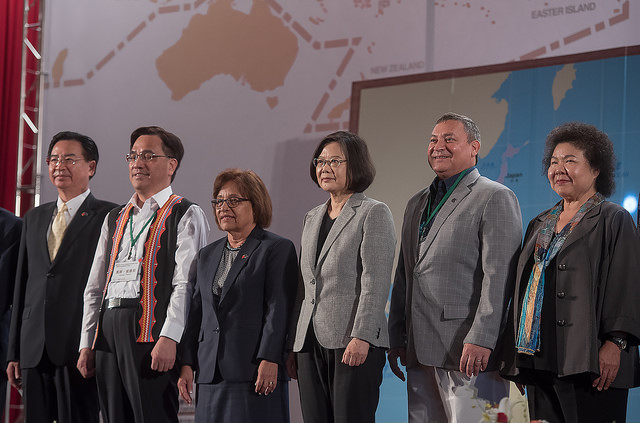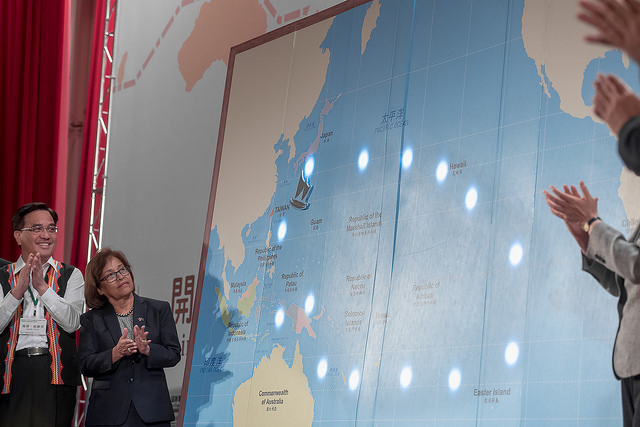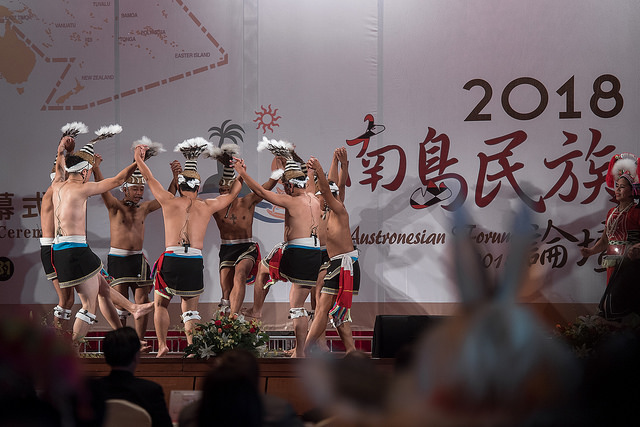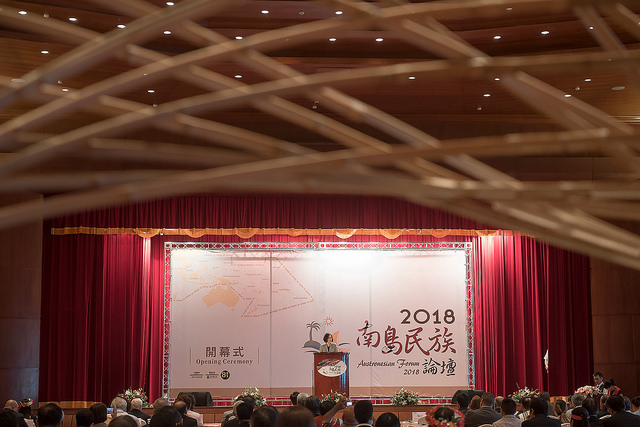News & activities
 News releases
News releases
On the morning of August 1, President Tsai Ing-wen attended the Austronesian Forum 2018. On behalf of the government and people of Taiwan, the president welcomed our Austronesian friends, and cited examples of similarities between the languages and cultures of Taiwan's indigenous peoples and Austronesians. She also expressed hope that we can all have greater dialogue and closer cooperation to achieve sustainable development goals, and join forces to contribute to peace and prosperity in the Pacific region.
A translation of the president's remarks is as follows:
On behalf of the government and people of Taiwan, I extend a very warm welcome to all of our Austronesian friends.
Today, August 1, is also Indigenous Peoples' Day in Taiwan. On this day 24 years ago, following long-standing efforts by our indigenous citizens, our Constitution for the first time adopted the term "indigenous peoples" and acknowledged their social status and rights. It is therefore a great honor to attend the opening ceremony of the Austronesian Forum on this special day.
Last year, I traveled to the Marshall Islands, Tuvalu, and the Solomon Islands, making transit stops in Hawaii and Guam. Every island on that trip left a deep impression on me because of their beautiful scenery as well as warm people.
Even more exciting was to see the extensive shared cultural heritage between the indigenous peoples of Taiwan and peoples of the Pacific region.
There are also great similarities in our languages. Just to name one example, the word "mata" means eye in the Amis, Bunun, Kavalan, Sakizaya, and Thao languages of Taiwan.
It has the same meaning in the Kiribati, Indonesian, Malay, Tagalog (Filipino), Hawaiian, and Maori languages. This symbolizes that Austronesian-speaking peoples look at the world from a similar perspective.
We share historical and cultural ties. For example, our ancestors all sailed out into the vast Pacific Ocean.
Last year, thanks to the assistance of the community on Taumako of the Solomon Islands, our Amis from Falangaw were able to recover their lost tradition of making "fayan" sailboats. Such a tale tells us that exchanges and cooperation among Austronesians are a way of keeping in touch with our history, and of passing on maritime culture.
Dr. Simon Scalopuka, who led the team to Taiwan to make "fayan" sailboats, is with us today. I would like to convey my sincere gratitude to him.
Through shared language and culture, Austronesians can engage in greater dialogue, and work together to care for our heritage. Austronesians can also engage in closer cooperation to assist one another in reaching sustainable development.
Such are my wishes for this Austronesian Forum. I believe that cooperation among all Austronesian sisters and brothers through constructive regional organizations will result in unique contributions to peace and prosperity not only in the Pacific, but for the entire human race.
On August 1 two years ago, as president, I apologized to our indigenous groups on behalf of our government.
Over the past two years, the government has put into practice pledges made on that day. At the Office of the President, we instituted the Indigenous Historical Justice and Transitional Justice Committee, while at the Executive Yuan we have established the Indigenous Peoples Basic Law Promotion Committee. We are continuing a dialogue with indigenous peoples on long-standing issues.
The Legislative Yuan has already passed the Indigenous Languages Development Act, according national language status to a number of indigenous languages. Cooperation between the Judicial Yuan and the Legal Aid Foundation has also seen the establishment of the Legal Center of Indigenous Peoples—a culturally sensitive institution. And every government agency has begun to solemnly address the issues of historical justice and transitional justice.
I understand that in the space of just two years, it would be extremely difficult to fully rectify the 400 years of oppression and neglect that indigenous peoples have been subjected to. Moreover, certain elements of Taiwanese society have yet to fully grasp the significance of transitional justice. However, change is now underway, and we will persevere, striving to improve understanding among ethnic groups.
Apart from these things, one essential piece of work still remains if we really want to see justice achieved in full—and that is education.
Experimental schools for indigenous children are currently being opened one after another throughout Taiwan. I have asked related agencies to support the development of our indigenous peoples' educational system to the greatest extent possible. The children of these communities have the right to learn within their own cultural environment and receive the comprehensive education that meets their tribes' expectations.
This in turn will let our indigenous peoples be able to pass on their language and culture to the generations to come, cultivating leaders for the future. An education model that embraces diverse cultures will also enrich Taiwan's vision of education.
Education is a topic of concern for all Austronesian communities. It is hoped that the Austronesian Forum will help generate more opportunities for the governments, tribes, and peoples of member countries to learn from one another.
We can gain insights from one another about how to come to terms with our past, and use this collective wisdom to shape our future. By combining resources, and cooperating through an appropriate division of labor, we can foster the talent needed for the sustainable development of Austronesian communities. This Forum can play a crucial role in realization of this important goal.
In conclusion, I would like to welcome everyone once again, and wish the Austronesian Forum the best of success. Through greater exchanges and cooperation, our Austronesian sisters and brothers can form even closer partnerships. Thank you and welcome to Taiwan.
Among those present were Secretary-General to the President Chen Chu (陳菊), Minister of the Council of Indigenous Peoples Icyang Parod (夷將‧拔路兒), Marshall Islands President Hilda C. Heine, Guam Governor Eddie Calvo, and Nicaraguan Ambassador to the ROC William Manuel Tapia Aleman (head of the foreign diplomatic corps in Taiwan).












